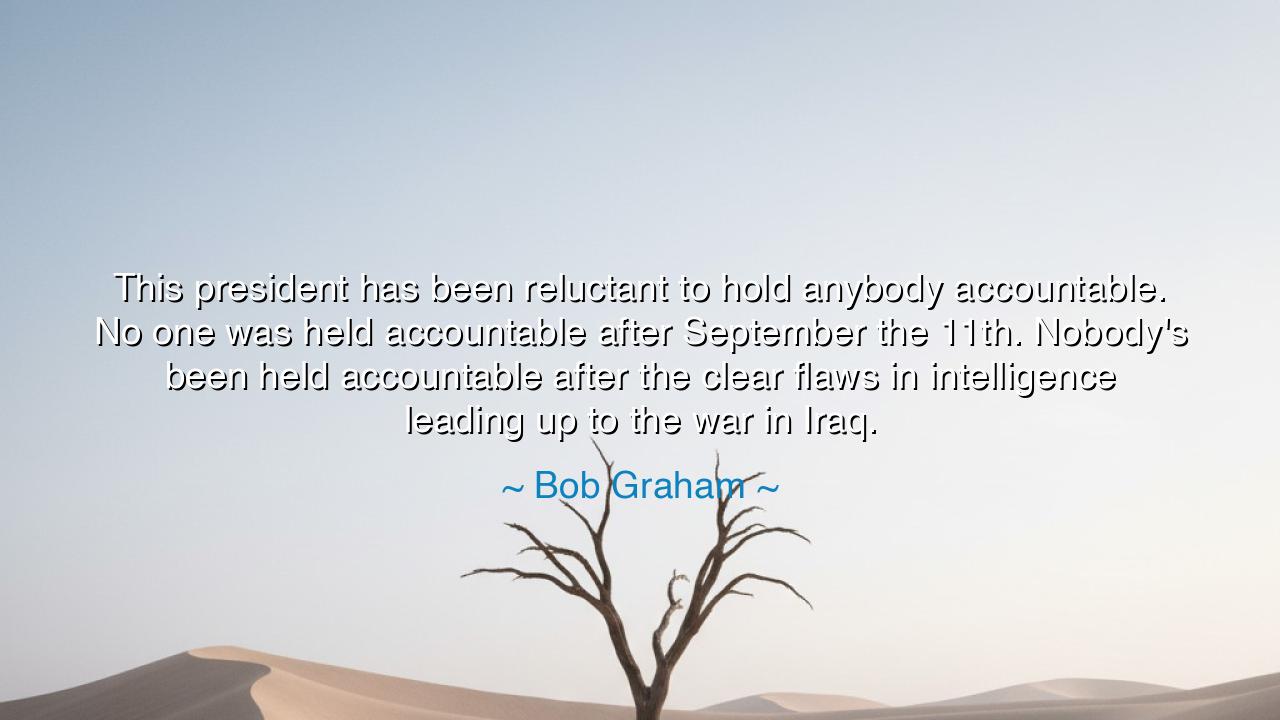
This president has been reluctant to hold anybody accountable. No
This president has been reluctant to hold anybody accountable. No one was held accountable after September the 11th. Nobody's been held accountable after the clear flaws in intelligence leading up to the war in Iraq.






“This president has been reluctant to hold anybody accountable. No one was held accountable after September the 11th. Nobody’s been held accountable after the clear flaws in intelligence leading up to the war in Iraq.” Thus spoke Bob Graham, a man of reason and conscience, who once served as both governor and senator, and who sought not vengeance, but responsibility. His words rise not in anger, but in sorrow — the lament of a statesman who witnessed a nation shaken by tragedy, then led astray by pride. In his voice echoes an ancient truth: that power without accountability is the seed of decline, and that no nation can endure long if those who wield authority refuse to answer for their failures.
This saying arose in the first decade of the twenty-first century, in the aftermath of the September 11 attacks and the war in Iraq — two events that scarred the conscience of a generation. In those years, the air was heavy with grief and fear, and the world seemed to spin upon the axis of violence and suspicion. The towers of New York had fallen, the deserts of the Middle East had erupted into fire, and through it all, questions burned unanswered: How had intelligence failed so grievously? Who had erred? Who would answer? But as Graham observed, no one was held accountable. The machinery of government turned, but not toward introspection — toward justification, deflection, and the preservation of image. And so he spoke, as a man burdened by the silence of those in power.
To hold someone accountable, in the moral sense, is to demand that deeds be weighed, that decisions be examined in the light of truth. In every age, the wise have understood that justice cannot thrive where responsibility is denied. The philosopher Confucius taught that a ruler’s first duty was to rectify names — to ensure that words and actions align, that titles such as “leader,” “guardian,” and “servant of the people” remain true. When a leader claims to act for the people but evades the judgment of his own errors, he dissolves the bond between trust and governance. Graham’s lament was not only about one president, but about a culture that confuses authority with righteousness and mistake with fate.
History offers many mirrors for his warning. Recall Emperor Nero, who burned his own capital and blamed it upon the innocent. His refusal to face his failures led Rome into moral ruin. Contrast this with Abraham Lincoln, who during the Civil War bore the weight of his own missteps openly. When Union generals faltered or when blood was shed in vain, Lincoln did not hide behind others — he accepted the blame and sought to learn. His humility preserved his greatness, for he understood what Bob Graham declared centuries later: that leadership is not the privilege of command, but the burden of answerability.
The heart of Graham’s message is the danger of evasion — that when leaders evade responsibility, nations drift toward cynicism and decay. After the wars and the failures, the people grow weary; they lose faith not only in rulers but in the very idea of justice. For justice is a fragile flame — it demands constant tending through truth and courage. When the powerful escape consequence, the powerless lose hope. Thus, his words are not merely political; they are moral prophecy — a call for all generations to remember that accountability is the lifeblood of democracy, and that silence in the face of error is complicity.
But Graham’s statement also carries an unspoken mercy. He does not call for revenge, but for reckoning — for a renewal of honesty and humility. To hold oneself accountable is not to dwell in shame, but to grow in wisdom. The errors of intelligence that led to war, the lapses that left a nation vulnerable, were not born only of malice, but of arrogance and haste — the twin enemies of discernment. When he speaks of “clear flaws,” he invites reflection: not to punish, but to learn, that such failures might not be repeated. For a society that cannot look back with clarity will walk blindly into the future.
Therefore, O listener, take this teaching into your heart. In your own life, as in the life of nations, practice accountability as a virtue, not a burden. When you err, name it; when you fail, face it; when others stumble, seek truth, not blame. Demand the same of your leaders — that they answer not only to power, but to principle. For the world is not destroyed by the wicked alone, but by the silence of those who look away. Let your strength be this: that you hold yourself and those above you to the light, that the lessons of failure may become the foundation of wisdom.
Thus, Bob Graham’s words stand as a pillar for all time: a reminder that civilizations fall not only through invasion or decay, but through the quiet rot of unaccountable power. Let us, then, keep alive the sacred balance — between freedom and responsibility, between justice and humility — that those who lead may remember that they, too, are servants of truth. For in the end, it is not the glory of a ruler that sustains a nation, but the honor of its accountability.






AAdministratorAdministrator
Welcome, honored guests. Please leave a comment, we will respond soon